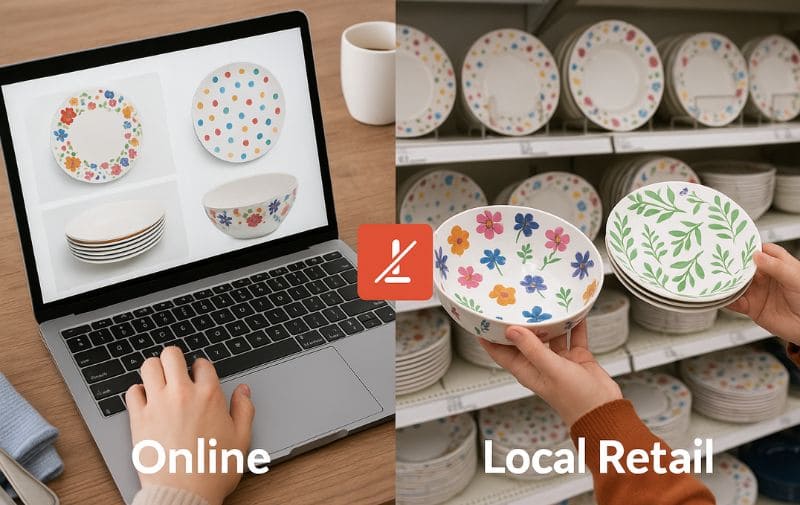Looking to buy melamine dinnerware but unsure where to start? Whether you’re a home user seeking stylish convenience or a business needing custom melamine dinnerware, this guide is your roadmap.
We’ll explore everything from major online retailers and supermarkets to specialist boutiques, wholesale channels, and direct manufacturers like Duramela, so you can confidently purchase melamine tableware that perfectly suits your requirements and budget. In 2025, with online experiences often starting with search engines, finding the right information efficiently is key.
Last Updated: May 2025 | Estimated Reading Time: 14 minutes
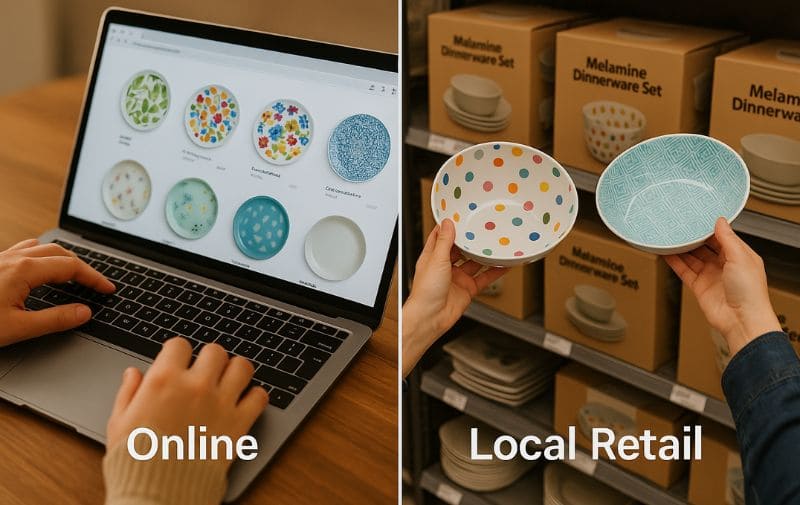
Buying Melamine for Your Home – Convenience vs. Curation
For personal use, finding melamine dinnerware is relatively straightforward. Your main choice often boils down to how much variety, uniqueness, and specific quality assurance you’re seeking. Good content structure is crucial for readability.
Where can you easily find melamine dinnerware for everyday personal use?
You’re likely to find a good selection for home use in several common places, each with its own advantages.
Which major online retail platforms (like Amazon) offer a vast selection?
Online giants like Amazon are a primary destination. You’ll find an enormous variety of melamine dinnerware sets, individual pieces, patterns, and price points. The sheer volume of sellers means you can often find something to match any decor.
What kind of melamine dinnerware can you expect at large supermarkets (Walmart, Target, Carrefour, Tesco, Jumbo) and general merchandise stores (IKEA, Kmart)?
Large supermarkets and general merchandise stores typically stock a range of melamine dinnerware, especially seasonal collections for outdoor dining or children’s use.
- Walmart, Target (North America), Carrefour, Tesco (Europe), Jumbo (some regions): Expect to find budget-friendly sets, often focused on current color trends or popular characters for kids. Selection can vary significantly by store and season.
- IKEA, Kmart: These stores often feature their own branded melamine lines, usually aligning with their broader home decor aesthetic – think simple, functional, and often Scandinavian-inspired designs (IKEA) or everyday value (Kmart).
What are the real pros and cons of buying melamine from mass retail channels?
Choosing mass retail offers clear benefits but also comes with certain limitations you should be aware of.
How does convenience and competitive pricing for standard sets stack up against design limitations?
- Pros:
- Convenience: Widely accessible both online and in physical stores.
- Competitive Pricing: Often the most budget-friendly option for standard sets due to bulk purchasing by retailers.
- Easy Returns: Generally straightforward return policies.
- Immediate Availability: Popular designs are usually in stock.
- Cons:
- Limited Designs: You’re restricted to existing patterns and shapes. Customization is virtually non-existent.
- Trend Lag: The “hot trends” you see might be 6-12 months behind what direct importers and specialized brands are developing.
Insider Tip: Are “hot retail trends” truly cutting-edge, and what should you look for regarding melamine grade (e.g., A5) on product details?
The “hot retail trends” are typically mass-market interpretations of broader design movements. For true cutting-edge or niche designs, you’ll need to look elsewhere.
Crucially, always check product descriptions for material specifications. Look for “100% melamine,” “A5 melamine,” or “food-grade melamine.” This information can sometimes be scarce on mass-market platforms, as retailers might prioritize cost. If it’s not clearly stated, be cautious, especially if the price seems too good to be true. A5 grade is the highest quality, food-safe melamine resin.
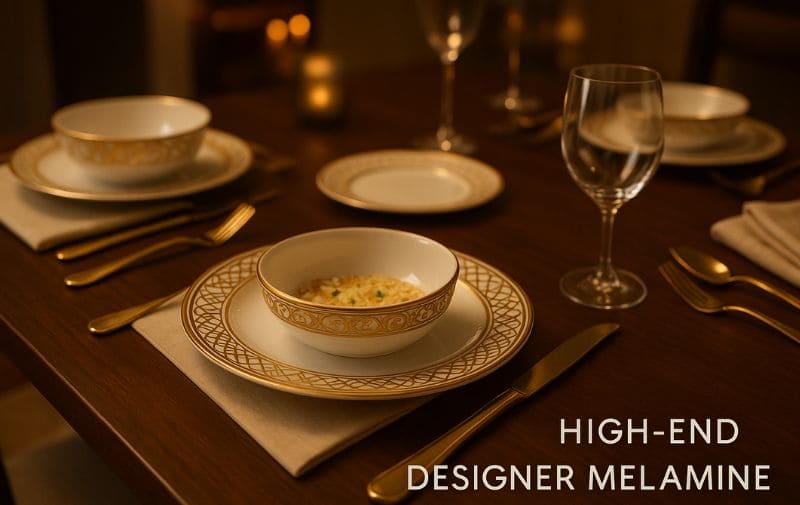
Are specialized homeware stores or online boutiques a better bet for unique, higher-quality melamine?
If you’re looking for something beyond basic sets, specialized stores can be a great option.
What kind of curated collections can you find in department stores (Macy’s, John Lewis) or independent kitchenware shops?
Department stores like Macy’s (USA) or John Lewis (UK), as well as independent kitchenware shops and niche online boutiques, often offer:
- More unique, design-forward collections.
- Items from smaller, specialized brands focusing on higher perceived quality or distinct aesthetics.
- Themed sets or individual pieces that feel more curated.
What’s the trade-off in terms of price, and how can you verify material quality and certifications (FDA, LFGB) in these stores?
- Trade-off: Expect a higher price point compared to mass retailers.
- Verification: The “uniqueness” is often in the print or brand association. The actual melamine quality might be similar to good mass-market A5 melamine unless it’s from a reputable specialized melamine brand that highlights its material sourcing.
Don’t hesitate to ask store staff about material certifications like FDA (USA), LFGB (EU), or BPA-Free status. Reputable stores stocking quality brands should be able to provide this information or direct you to the brand’s resources.
✨ Home Buyer’s Quick Glance: Mass Retail vs. Specialized Stores for Melamine ✨
| Feature | Mass Retail (e.g., Amazon, Walmart) | Specialized Homeware Stores/Boutiques |
|---|---|---|
| Primary Appeal | 💲 Convenience & Budget | 🎨 Unique Designs & Curation |
| Variety | Vast (Standard Designs) | Moderate (Niche & Designer) |
| Price Point | Low to Medium | Medium to High |
| Customization | ⛔ None | ⛔ None |
| Quality Info | May require digging | Often more transparent / Brand-focused |
| “Latest Trends” | Popular, mass-market versions | Potentially more cutting-edge |
| Best For You If | You need affordable, everyday sets. | You seek unique pieces & aesthetics. |
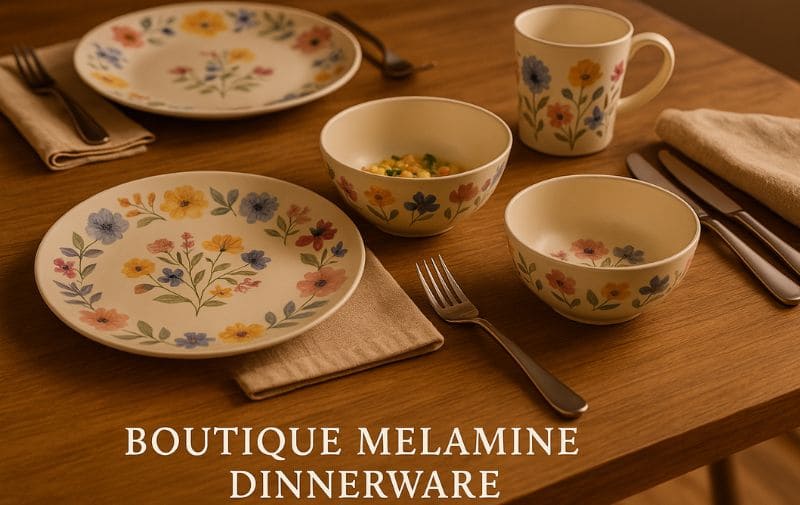
Sourcing for Your Business – Unlocking Wholesale & Direct Manufacturing Power
For businesses like restaurants, hotels, schools, or promotional product companies, sourcing melamine dinnerware involves different considerations, primarily volume, customization, and cost-effectiveness. This section provides practical advice for businesses.
When does buying from traditional wholesalers or distributors make sense for your business?
Wholesalers can be a practical option for businesses needing standard, off-the-shelf melamine items in bulk.
Which businesses (e.g., needing stock items quickly) benefit most from regional restaurant suppliers or B2B wholesale platforms?
- Restaurants, cafes, and caterers needing standard items like plain white or black A5 melamine plates, bowls, and platters quickly.
- Businesses that require a consistent supply of stock designs and can benefit from the wholesaler’s local inventory.
- Companies looking to consolidate purchases of various supplies (e.g., cutlery, glassware, and melamine) from one source.
What are the typical MOQs and customization limits you’ll encounter with wholesalers?
- MOQs (Minimum Order Quantities): Wholesalers will have MOQs, but these are typically for standard, non-custom items and are generally lower than direct factory custom orders. For example, you might need to buy a case of 24 plates rather than individual units.
- Customization Limits: Customization options through wholesalers are usually very limited. They primarily sell what their manufacturing partners offer as stock. If they do offer customization, it’s often basic logo printing on existing items, and you’re adding another layer (and cost) to the supply chain.
Insider Tip: How does using a wholesaler impact your supply chain and options for truly bespoke designs?
Using a wholesaler means they are an intermediary between you and the manufacturer. This can simplify logistics for stock items but adds cost and complexity if you need truly bespoke (custom-made) designs.
Their core business is distribution, not managing your unique custom design project from scratch. They are an excellent choice if you need, say, 500 standard A5 melamine soup bowls by next week. For anything more complex, consider going direct.
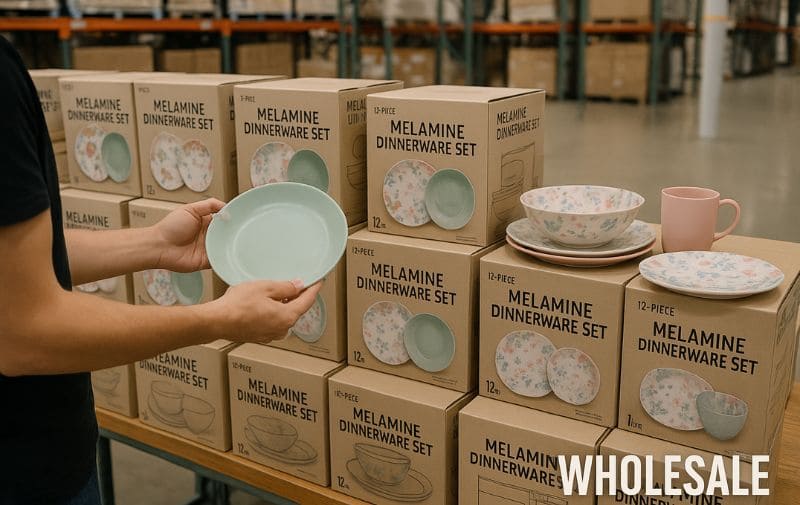
Why is sourcing directly from a manufacturer (e.g., Duramela) often the “gold standard” for custom B2B melamine needs?
When your business requires unique branding, specific designs, or optimal cost-effectiveness for larger volumes, direct manufacturing is usually the best path.
Who exactly benefits most: Hotels, restaurant chains, schools, OEM brands, promotional gift buyers, or specialized importers?
All of the above! Specifically:
- Hotels & Restaurant Chains: For branded dinnerware that enhances guest experience and brand consistency.
- Schools & Cafeterias: For durable, safe, and often custom-printed trays and dinnerware.
- OEM Brands: Companies that want to sell melamine dinnerware under their own brand name.
- Promotional Gift Buyers: For unique, branded items for marketing campaigns or corporate gifts.
- Specialized Importers/Wholesalers: Businesses that develop and import their own lines of melamine or bamboo fiber dinnerware for resale.
How does 100% customization work in practice – from Pantone colors and artwork to unique shapes and surface finishes? (Mention mold costs for new shapes)
This is where direct manufacturing shines. Reputable manufacturers like Duramela offer:
- Exact Pantone Color Matching: Ensure your brand colors are perfectly replicated.
- Custom Artwork & Logos: Your designs, logos, and patterns applied precisely.
- Unique Surface Finishes: Options like matte, gloss, textured, or even two-tone effects.
- New Product Shapes/Dimensions: If you need a completely unique item, new molds can be created. (Note: Creating new molds involves an upfront investment, typically ranging from a few thousand to tens of thousands of dollars depending on complexity, but allows for truly unique products.)
How can direct sourcing offer the best cost-effectiveness for custom melamine dinnerware?
By cutting out intermediaries (wholesalers, distributors, agents), you access factory-direct pricing. This is especially significant for custom melamine dinnerware orders where the value-added design work is best managed efficiently by the source.
How flexible can MOQs truly be with manufacturers like Duramela (e.g., custom print on existing mold vs. new mold, startup solutions)?
While industry-standard MOQs for fully custom orders (new mold + custom print) might be 2,000-3,000 pieces per design/color, experienced and customer-focused manufacturers like Duramela often offer more flexibility:
- Custom Print on Existing Mold: If you use one of their existing bowl or plate shapes and only require a custom print, the MOQ can be significantly lower (e.g., 500-1000 pieces per design).
- Combining Smaller Runs: Sometimes, they can group smaller orders for similar production processes.
- Startup Solutions: They may have programs or options to help new businesses or those testing new designs with more manageable initial volumes. This flexibility is a huge, often underestimated, advantage.
What quality control expertise and supply chain transparency can you expect when working directly with melamine or bamboo fiber specialists?
- Quality Control Expertise: You’re dealing with specialists who deeply understand material grades (e.g., crucial differences between A1, A3, and A5 melamine), food-grade compliance for various markets (FDA, LFGB, Prop 65), and the nuances of bamboo fiber production.
- Supply Chain Transparency: Direct communication leads to clearer insights into production timelines, material sourcing, testing protocols, and certification processes. You have a direct line to address any concerns.
Debunking a Myth: Why is it nearly impossible to get small custom orders from big retailers, and why is direct manufacturing key here?
Many designers or small businesses dream of getting a small custom run produced and sold through a major retailer. This rarely, if ever, works. Big retailers are structured for mass distribution of existing Stock Keeping Units (SKUs) and have massive volume requirements. For custom melamine dinnerware, especially for initial or smaller volume runs, a direct relationship with a capable manufacturer is the essential pathway.
🏭 Navigating the Custom Melamine Order Process (with a Direct Manufacturer) 🏭
| Step No. | Process Stage | Key Actions & Considerations | 💡 Pro Tip |
|---|---|---|---|
| 1 | Inquiry & Design Brief | Submit your design (artwork, Pantone colors, shape ideas), quantity, target price, timeline. | Be as detailed as possible. Provide vector artwork (AI, EPS). |
| 2 | Quotation & Mold Discussion | Manufacturer provides quote, discusses mold options (existing vs. new), mold costs if any. | Clarify all cost components. Understand mold ownership. |
| 3 | Quality Sample (Optional but Rec.) | Request/review existing samples to assess general quality (if new to supplier). | Helps set expectations for material feel and print quality. |
| 4 | Order Confirmation & Deposit | Formalize order, agree on terms, pay deposit (typically 30-50%). | Ensure all specifications are in the Purchase Order (PO). |
| 5 | Pre-Production Sample (PPS) | Manufacturer creates a physical sample with your exact design. | CRITICAL STEP! Do not skip. Allow time for shipping and review. |
| 6 | PPS Approval/Revisions | You review and approve the PPS. If revisions are needed, communicate clearly. Another PPS may be required. | Document feedback meticulously. Photos/videos can help. |
| 7 | Mass Production | Upon PPS approval, full production begins. | Request production updates if needed, especially for large orders. |
| 8 | Quality Control (QC) | Manufacturer performs internal QC. You can also arrange 3rd party QC (especially for B2B). | Define AQL (Acceptable Quality Limits) if using 3rd party QC. |
| 9 | Balance Payment & Shipping | Pay balance amount. Manufacturer arranges shipping as per agreed Incoterms (FOB, CIF, etc.). | Confirm shipping documents and tracking. |
| 10 | Goods Received & Feedback | Inspect goods upon arrival. Provide feedback to the manufacturer. | Address any discrepancies immediately. |
This comprehensive process ensures that your custom melamine dinnerware meets your exact specifications and quality standards when working directly with a manufacturer like Duramela.
Expanding Your Search – Trade Shows & Online B2B Platforms
Beyond direct outreach, there are other avenues for businesses to connect with melamine dinnerware suppliers and manufacturers.
How can attending B2B trade shows (Canton Fair, Ambiente, Chicago Housewares Show) help you find melamine manufacturers?
Trade shows are excellent venues for discovery and relationship-building.
- Canton Fair (Guangzhou, China): One of the largest general trade fairs, with many homeware and kitchenware exhibitors, including melamine.
- Ambiente (Frankfurt, Germany): A leading international consumer goods fair with a strong focus on dining, tableware, and kitchenware.
- The Inspired Home Show (formerly Chicago Housewares Show): Major North American event for home and housewares products.
What’s the real purpose of these shows for buyers, and how can you prepare for productive conversations?
- Purpose: You don’t typically “buy” products directly at the show. The goal is to meet potential suppliers, see their product quality and capabilities firsthand, discuss your needs, and establish initial relationships for follow-up.
- Preparation:
- Define your needs clearly (product types, target quality, potential volumes, customization ideas).
- Research exhibitors beforehand.
- Prepare your company introduction and specific questions.
- Bring design concepts or sketches if you’re looking for custom work.
What are the opportunities and pitfalls of using online B2B sourcing platforms like Alibaba?
Platforms like Alibaba, DHGate, or Global Sources can connect you with a vast number of potential melamine dinnerware suppliers, especially from Asia.
How crucial is thorough due diligence, verifying certifications, factory audits, and always getting samples when using these platforms?
- Opportunities: Access to a huge supplier base, potentially competitive pricing.
- Pitfalls & Due Diligence (Absolutely CRITICAL):
- Verification Overload: It can be hard to vet suppliers effectively.
- Quality Concerns: Risk of misrepresentation or inconsistent quality.
- Certification Claims: Always verify claims of FDA, LFGB, etc., by requesting actual test reports from accredited labs.
- Factory Audits: For significant orders, consider third-party factory audits.
- SAMPLES ARE NON-NEGOTIABLE: Always get samples (quality samples, pre-production samples) before committing to any bulk order. Pay for them if necessary; it’s a small price to avoid a large mistake.
- Communication: Language barriers can sometimes be an issue.
- A direct referral to, or working with, an established and reputable name like Duramela often significantly reduces these risks.
Special Focus – The Rise of Bamboo Fiber Dinnerware
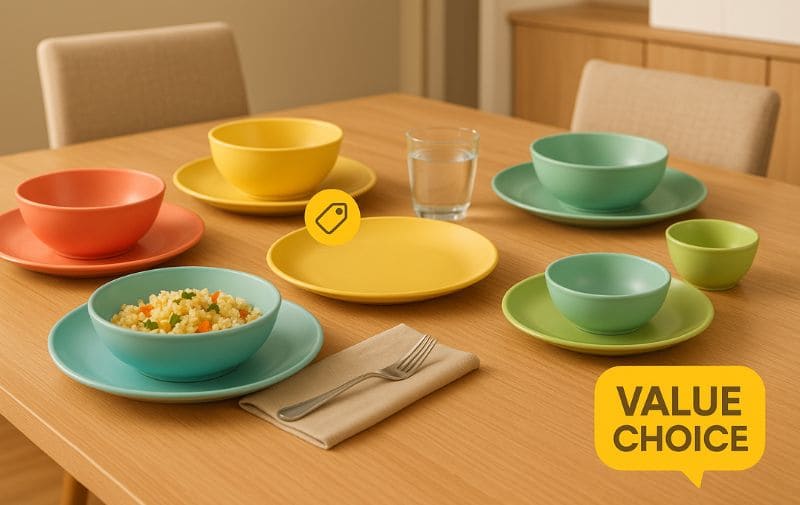
Bamboo fiber dinnerware, often marketed as an eco-friendlier alternative, is growing in popularity. Sourcing it requires similar diligence.
Where are the best places to source bamboo fiber dinnerware?
Sourcing channels are similar to melamine, but with a few key nuances.
Are sourcing channels similar to melamine, and why are specialized eco-conscious retailers or direct manufacturers (like Duramela) often preferred?
Yes, you can find bamboo fiber dinnerware through mass retail, specialized eco-stores, and direct from manufacturers.
- Specialized Eco-Conscious Retailers: Often curate brands that focus on sustainability and provide more transparency about materials.
- Direct Manufacturers (like Duramela): Working with manufacturers who specialize in both melamine and bamboo fiber (as Duramela does) is highly advantageous. They understand the specific production processes, the importance of the binder material, and can ensure consistent quality.
What critical quality check should you perform regarding the melamine binder in bamboo fiber products (e.g., ensuring it’s A5 food-grade)?
This is crucial: Most bamboo fiber dinnerware uses melamine resin as a binder to give it durability and heat resistance.
- Ensure the binder is food-grade A5 melamine. Low-quality melamine binders (like A1 or A3, or urea-formaldehyde which is not food safe) can compromise the safety and integrity of the product.
- Ask specific questions about the binder used and request certifications for the finished product, not just the bamboo component.
🌿 Melamine vs. Bamboo Fiber Dinnerware: A Quick Look 🌿
| Feature | Melamine Dinnerware | Bamboo Fiber Dinnerware (with Melamine Binder) |
|---|---|---|
| Primary Material | Melamine Resin (A5 Grade is best) | Bamboo Powder + Melamine Resin (A5 Binder crucial) |
| Look & Feel | Smooth, glossy, ceramic-like (often) | Often matte, can have visible fibers, earthy feel |
| Durability | Very High, shatter-resistant | High, shatter-resistant (binder dependent) |
| Weight | Lightweight | Generally lightweight, can be slightly heavier |
| Eco-Perception | Plastic-based | Perceived as more eco-friendly (renewable bamboo) |
| Key Benefit | Extreme durability, vibrant prints | Sustainable material source, unique aesthetic |
| Key Concern | Not microwave/oven safe, end-of-life | Binder quality (must be A5 melamine), not microwave/oven safe |
| Ideal Use Case | Outdoor, kids, high-traffic restaurants | Eco-conscious consumers, unique table settings |
| What to Verify | A5 Grade, FDA/LFGB certs | A5 Grade Melamine Binder, FDA/LFGB certs for finished product |
Essential Checks for ALL Buyers – Your Quality & Satisfaction Checklist
Regardless of where or what you’re buying, certain checks are non-negotiable to ensure you get quality products. This is practical, implementable advice that users can apply.
Why is requesting and approving samples absolutely non-negotiable, especially for custom melamine orders?
Samples are your best insurance against disappointment and costly mistakes.
What’s the difference between a quality sample and a pre-production sample (PPS), and why do you need them?
- Quality Sample (QS) / Stock Sample: An existing product from the supplier that demonstrates their general manufacturing quality, material finish, and print capability. Helps you assess their overall standards.
- Pre-Production Sample (PPS): A sample made with your specific custom design, colors, and artwork before mass production begins. This is your final chance to approve every detail.
- Why you need both (especially for B2B custom orders): The QS tells you if they can make good products. The PPS tells you if they’ve correctly executed your specific product.
- Why you need both (especially for B2B custom orders): The QS tells you if they can make good products. The PPS tells you if they’ve correctly executed your specific product.
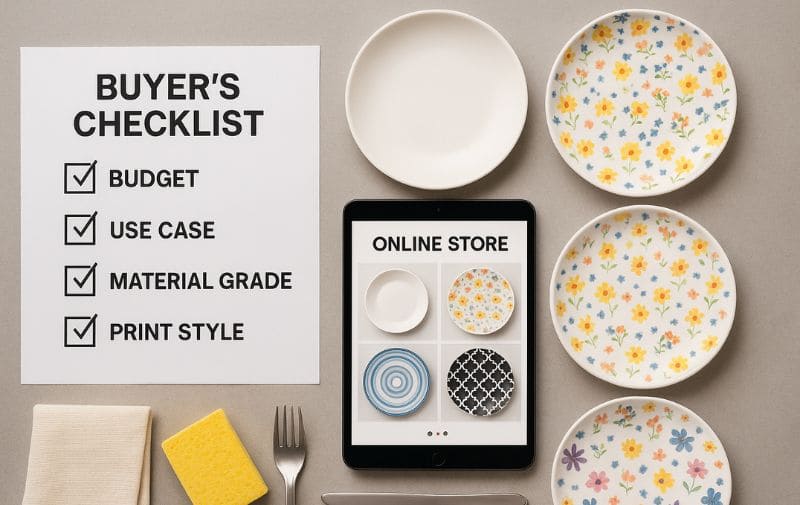
How can you effectively verify supplier claims about certifications like FDA, LFGB, or BPA-Free?
Don’t just take their word for it. Claims are easy to make.
Why should you always ask to see actual test reports, and what does a trustworthy supplier do?
- Ask for Test Reports: Request copies of current, valid test reports from accredited, independent laboratories for the specific material/product you’re interested in.
- Check Report Details: Ensure the report is for the correct material (e.g., A5 melamine), tests for relevant standards (FDA, LFGB, BPA, etc.), and the company name matches your supplier. Check the date of the report.
- Trustworthy Suppliers: Reputable suppliers (like Duramela) will readily provide these documents. They understand the importance of compliance and transparency. If a supplier is hesitant or provides vague assurances, it’s a red flag.
✅ Your Pre-Order Checklist: Key Questions for Melamine Suppliers ✅
| Category | Question for Supplier | Why It’s Important | 🤔 Your Notes |
|---|---|---|---|
| Material Quality | What grade of melamine do you use (e.g., A5, A3, A1)? Is it 100% melamine? | Ensures food safety and durability (A5 is best for food contact). | |
| For bamboo fiber: What is the binder material, and is it food-grade (e.g., A5 melamine)? | Critical for safety of bamboo fiber products. | ||
| Certifications | Can you provide current FDA, LFGB, BPA-Free (as applicable) test reports for this product? | Verifies safety claims and compliance with regional standards. | |
| Customization | What are your full customization capabilities (colors, prints, shapes, finishes)? | Understands the scope of what they can produce for you. | |
| MOQs | What is your MOQ for my specific order (custom print on stock vs. new mold)? | Determines if their minimums align with your needs and budget. | |
| Sampling | What is your process and cost for quality samples and pre-production samples (PPS)? | Essential for quality approval before mass production. | |
| Lead Times | What is the estimated production lead time for my order after PPS approval? | Helps in planning your inventory and timelines. | |
| Pricing | Can you provide a detailed quote including unit price, mold costs (if any), shipping? | Ensures clarity on all costs involved. | |
| Experience | Can you share examples of similar projects or clients you’ve worked with? | Gauges their experience and suitability for your project. (Especially for B2B) | |
| Communication | Who will be my main point of contact, and how will we manage communication? | Establishes clear communication channels. |
Making the Smart Choice – Which Melamine Sourcing Path is Right for You?
The “best” place to buy melamine dinnerware depends entirely on your specific needs.
How do your volume, customization needs, and desire for control dictate the best sourcing strategy?
- Individual/Home Use (Low Volume, No Customization): Online retailers (Amazon), supermarkets (Walmart, Target, IKEA), or specialized homeware boutiques are your best bet for convenience and variety of existing designs.
- Small Business (Low-Medium Volume, Minor/No Customization, Quick Stock): Wholesalers or larger online B2B platforms (with due diligence) can work.
- Business (Any Volume, HIGH Customization, Brand Control, Best Value for Custom): Direct from a reputable manufacturer (e.g., Duramela) is almost always the optimal path.
🍽️ Comparing Melamine Dinnerware Sourcing Channels (Overall) 🍽️
| Feature | Mass Retail (Amazon, Walmart) | Specialized Homeware Stores | Wholesalers/Distributors | Direct Manufacturer (e.g., Duramela) | Online B2B Platforms (Alibaba) |
|---|---|---|---|---|---|
| Target User | Home User | Home User (Discerning) | Business (Stock Items) | Business (Custom & Volume) | Business (Variable) |
| Customization | ⛔ None | ⛔ None to Minimal | 🟡 Limited (Logo print) | ✅ Full (Shape, Print, Color) | 🟡 Variable, Risky |
| Price (Per Unit) | 💲 Low to Medium | 💲💲 Medium to High | 💲💲 Medium (Bulk) | 💲 Best for Custom | 💲❓ Variable, Check Total Cost |
| MOQ | None | None | ✅ Low to Medium (Cases) | ✅ Flexible (Contextual) | 🟡 Variable, Often High |
| Design Variety | ✅ Wide (Existing) | ✅ Curated (Existing) | 🟡 Standard Stock | ✅ Unlimited (Your Design) | ✅ Very Wide (Existing) |
| Quality Control | ❓ Variable, Buyer Beware | 🟡 Generally Good | 🟡 Generally Good | ✅ Direct Oversight | ❓❓ High Risk, Needs Vetting |
| Direct Communication | ⛔ No | 🟡 Limited | 🟡 With Wholesaler | ✅ With Factory | 🟡 Variable, Can Be Difficult |
| Lead Time (Stock) | Fast | Fast | Fast to Medium | N/A (Custom Focus) | Medium to Long |
| Lead Time (Custom) | N/A | N/A | Slow, Limited Options | ✅ Best Control | ❓ Variable, Can Be Unreliable |
| Best For | Everyday home use, gifts | Unique home items | Quick bulk stock | Branded, OEM, unique designs | Sourcing diverse suppliers (caution!) |
Frequently Asked Questions (FAQ) About Buying Melamine Dinnerware
Here are answers to some common questions you might have:
1. Is all melamine dinnerware safe for food use?
Not necessarily. It’s crucial to ensure you’re buying A5 grade melamine, which is specifically formulated for food contact and is the highest quality. Lower grades (like A1 or A3) or products with non-food-grade fillers may not be safe. Always look for “100% melamine” or “A5 melamine” and check for FDA/LFGB certifications, especially when buying from less established sources.
2. Can I get custom-designed melamine dinnerware in small quantities for my home?
Directly, this is very difficult and often cost-prohibitive for very small (e.g., single set) home orders due to setup and potential mold costs. Mass retailers and boutiques sell pre-designed sets. For businesses or larger personal projects (e.g., a large event), manufacturers like Duramela can offer custom prints on existing molds with more flexible MOQs (e.g., starting around 500-1000 pieces).
3. What’s more important when choosing a supplier: price or verified quality certifications?
While price is a factor, verified quality and safety certifications (like FDA, LFGB, A5 grade material) should be paramount, especially for items that come into contact with food. Sacrificing quality for a lower price can lead to unsafe products, durability issues, and potential legal problems for businesses. Always prioritize suppliers who are transparent about their materials and can provide test reports.
4. How can I tell if a “bamboo fiber” plate is actually good quality and safe?
The key is the binder material, which is usually melamine. Ask the supplier to confirm that the melamine binder used is A5 food-grade. Also, request test reports for the finished bamboo fiber product that verify its compliance with food safety standards like FDA or LFGB. Be wary of vague “eco-friendly” claims without specific material and safety verifications.
Final Thoughts
Choosing where to buy melamine dinnerware doesn’t have to be overwhelming. By understanding your own needs for volume, design, customization, and budget, and by knowing the strengths and weaknesses of each sourcing channel, you can make an informed decision.
For everyday home use, retail offers convenience. For businesses seeking unique, branded, and cost-effective solutions, partnering directly with a knowledgeable and flexible melamine dinnerware manufacturer is often the smartest path to success.
Recommended Links:
- Designing Your Custom Melamine Dinnerware: Duramela
- Ambiente Show – The Show for Dining, Giving, Living (Example of a major relevant trade show)
- Alibaba.com – Global B2B Sourcing Platform (Example of a B2B platform, use with due diligence advice from article)

